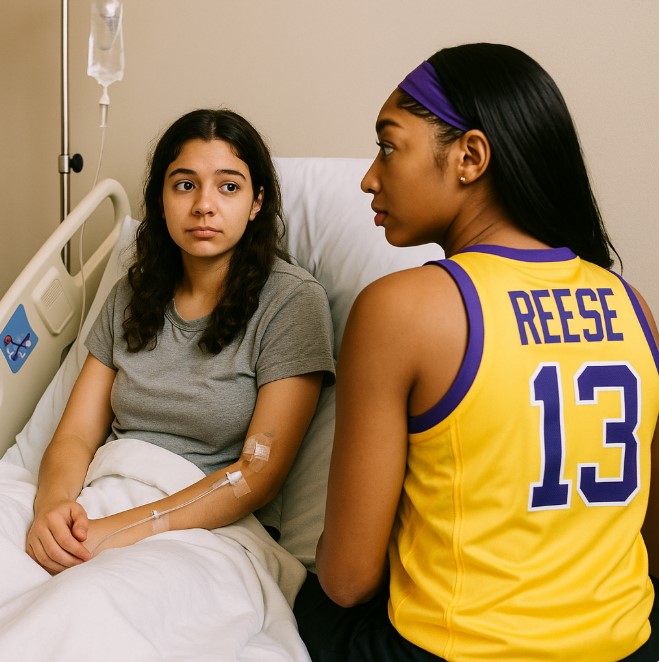In the quiet corridors of the hospital, where the scent of antiseptic lingers and time seems to move just a little slower, Angel Reese walked with soft steps, carrying with her not just a bouquet of flowers, but also a heart filled with worry she had no words for.
Though her posture was calm and her expression composed, every movement carried the weight of silent concern—a kind that doesn’t make itself known through tears or panic, but instead quietly settles into the soul, persistent and heavy like a storm that never breaks.
She had made these visits regularly now, slipping between practice schedules, media obligations, and the overwhelming rush of professional life, just to spend an hour or two with someone who once knew her beyond fame, beyond lights, beyond courts and crowds.

As she entered the room, she was greeted with a familiar smile from her friend lying in the hospital bed—an expression that tried to be strong, tried to be normal, tried to be the version of themselves that didn’t need pity or sorrow from anyone, especially not Angel.
They talked, as they always did, about small things and everyday stories, about what Angel saw on the way there, about a funny thing that happened at practice, and about the outside world that still kept turning, even when one of them had paused inside these white, sterile walls.
To anyone watching from the outside, it would seem like a warm, lighthearted visit between two friends who shared genuine affection, laughter, and good memories—but beneath each smile and chuckle lay a quiet gravity neither dared to speak aloud.
Angel’s hands rested lightly on the edge of the bed, and every now and then, her eyes would drift—not in distraction, but in thought—as though she were calculating how much strength she needed to keep herself from breaking.
She wanted to ask how much pain her friend was in, whether the doctors had said something new, whether the silence in the room meant there was something no one had the courage to share just yet.
But instead, she asked about a show they both loved, about a memory they once laughed over until they cried, about anything that didn’t sound like fear, because fear had no place in the few minutes they had together.
Her friend, brave as ever, played along with ease, throwing in jokes and anecdotes, determined not to let the illness become the only topic that filled the room—even though it lived in every shadow, every monitor beep, and every breath that took a little longer than it should.

Angel’s smile came and went like the tides—graceful and warm on the surface, but beneath it, something vast was shifting, pulling at her resolve, testing how long she could pretend to be only a visitor and not a woman slowly unraveling inside.
There were moments when their eyes met and lingered just a beat too long—moments when words hovered between them, unsaid, because some truths are too tender, too sharp, and too real to be given voice without making everything hurt more.
She squeezed her friend’s hand, gently but firmly, as if that silent gesture could communicate everything she didn’t have the courage to say: “I’m here, I’m scared, I don’t want to lose you, but I won’t let that fear show.”
Outside the room, life continued its usual, indifferent rhythm—nurses passed by with clipboards, machines beeped in intervals, and sunlight moved slowly across the hospital tiles—but inside that space, time bent itself around two souls bound by something deeper than words.
Angel thought of the days they spent as carefree teenagers, when injuries meant a few days off the court and hospital visits were rare, and illness was something that happened to other people in faraway places—not someone she loved, not someone who always felt unbreakable.
She remembered the first time she got the call, the way her heart sank before she even heard the full sentence, how her legs almost buckled beneath her and how, since then, every good day had a shadow behind it.

Now, as her friend smiled at something silly she had just said, Angel smiled back—but she knew it wasn’t the same kind of smile she used to wear; this one carried layers, history, and an ache that no amount of joy could fully mask.
She wondered whether it was selfish to hope, to wish that this would just be a chapter and not the ending, to imagine that someday they’d laugh about this too, sitting under the sun, healthy and alive and far away from the sterile smell of hospitals.
Her friend noticed the flicker in her eyes but didn’t comment—perhaps out of kindness, or perhaps because they too carried the same flicker, hidden just behind the effort it took to be cheerful when your body is slowly betraying you.
They talked a little more, slowly, stretching each word like a thread trying to hold something from falling apart, avoiding pauses that might give way to tears, and carefully dancing around the heavy truths that filled the room even more than oxygen.
When it was time for Angel to leave, she stood up reluctantly, her heart dragging behind her like a suitcase too full of unspoken feelings and silent pleas; she leaned in and hugged her friend gently, as if afraid she might hurt them by holding too tight.

Her friend whispered, “Thank you,” and Angel nodded, blinking back the sting in her eyes—because it wasn’t just thanks for the visit, but for the effort, the strength, the shared silence, and the love that showed up even when words failed.
As she stepped into the hallway again, back into the world that expected her to be strong, confident, and composed, she carried with her a piece of that room—a reminder that some of life’s heaviest emotions are the ones we bear with a smile.
She didn’t cry, not yet; instead, she took a deep breath, straightened her back, and walked forward like she always did—because even the strongest ones sometimes have to keep moving, carrying a sorrow they never quite know how to put into words.